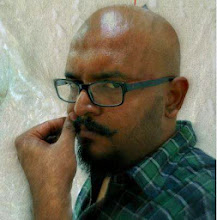
Gentle waves impatiently washed against the dyke at the GCDA building in Cochin; each wave more frustrated than the previous one. Grey balloon clouds waited eagerly for an arrow of cold breeze to burst them to life. As nature’s drama unfolded in the seas and the skies, a little and ageing shopping complex stood beneath unsuspectingly.
Hiralal was on the last page of his third newspaper when the first customer walked through the door of the handicraft store. He had finished his two Gujarati dailies and was now flipping through the pictures in the English one. The store hardly attracted customers this time of the year. Tourists formed a majority of his clientele and during the monsoons they sought comfort in drier lands. The store was also one of the many and the smallest among around 15 handicraft stores packed into the tiny complex. So even on business days, footfalls were few and far between. But this was a Sunday, and this was the only store in the complex that was open; therefore the rare customer.
Hiralal welcomed him with a smile only wolves in lambskins and Marwari merchants were capable of. He welcomed the customer in with his arm around his shoulder, chatting away about the weather, his troubled stomach, the cricket match and of course, the items on sale.
The customer walked around the store in amazement. Though tiny, the store stocked some really beautiful and exotic pieces. The customer ran his finger over several brass statues and wooden sculptures with a twinkle in his eye. The glint vanished and a disappointed frown replaced it as he tipped over the price tags with a nimble touch of his fingers - something that Indian shoppers had mastered over the years. Sensing the dejection on the customer’s face, Hiralal approached him with a look of genuine sympathy – a look that made the smile mentioned earlier seem evil.
“What do you want?” asked Hiralal. The customer reluctantly turned at him, a look of disappointment drawn across his face. “Well,” he said, still fiddling with the price tag. “I am a student of art from Himachal. I traveled the length and breadth of India collecting exotic and rare pieces before I reached Kerala. This is my last destination and I am almost out of money. If I’d known about these treasures I’d find here, I would have saved up and bough out the entire store. But alas!”
Now it was Hiralal’s turn to look helpless. He stood in front of the customer, lost in thought. He walked over to the calendar on the wall, flipped through a few pages muttering something to himself. He walked over to the cash counter and picked up a notebook. He flipped through a few pages, stopped at one and ran his fingers down as if following a list. A slight smile appeared on his face. He slapped the book shut, and with a smile that had now become a broad grin, walked up to the customer.
“Today, is your lucky day sir!” he exclaimed. The man looked at Hiralal with an expression of puzzlement. “We made a considerable profit over the last month and I think I can strike you a reasonable deal. A very very reasonable deal,” Hiralal continued. The man walked briskly up to Hiralal and hugged him tightly. In the next hour, the young man rampaged around the store like an elephant in the sugarcane field. Hiralal had struck him such a deal that items earlier out of reach for his pocket seemed cheap. Bronze statues, marble sculptures, wooden carvings – The young man’s rucksack kept growing by the minute.
It was almost evening by the time Hiralal waved at the young man from the door as he walked away with his hands and heart full. As the young man disappeared into the crowd, Hiralal turned and walked up to his newspaper. He was just about picking up his reading glasses when a voice distracted him. It was Ghanshyam, the owner of the store… and his competitor.



